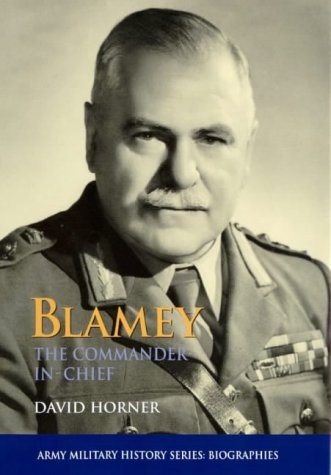SUPERIOR AS NEW COPY. Blamey: The Commander-in-Chief is a new biography of Sir Thomas Blamey, the only Australian soldier to reach the rank of Field Marshal. Blamey was Australia’s greatest and most important soldier, and a major figure in Australian history, despite his not being Australia’s most accomplished battlefield commander, or a great innovator or reformer. He was not loved, admired or even respected by many of the soldiers he commanded and the politicians he worked for.
In the First World War Blamey was chief of staff to Sir John Monash. But his fame is due to his military achievements in the Second World War. He was Australia’s top soldier for almost all of the war, commanding the Australian Imperial Force in the Middle East, and all of the Australian Army after Japan entered the war. He served Prime Ministers Robert Menzies and John Curtin, was a senior subordinate to the British Field Marshals Wavell, Wilson and Auchinleck in the Middle East, and worked directly under General Douglas MacArthur in the Southwest Pacific Area.
Blamey was a controversial figure. This study, based on extensive research, and drawing on the author’s deep understanding of the Army and the Second World War, goes beyond the controversies to examine Blamey’s achievements as a commander, policy-maker and administrator. It does not overlook Blamey’s weaknesses, mistakes and human foibles, but seeks to balance these against an assessment of his performance when Australia faced its biggest challenge.
The biography of Field Marshal Sir Thomas Blamey. Now a scarce and long out of print publication about one of Australia’s most famous generals.
This volume is recognised as the best biography of this contoversial commander. Horner ranks in the front rank of Australian military historians and has a world-wide reputation. He is expert in this topic area.
Thomas Blamey, born near Wagga Wagga on 24 January 1884, became the first Australian army officer to reach the rank of field marshal. Originally a teacher, Blamey received a commission in the Commonwealth Cadet Forces in 1906 and was posted to Melbourne.
In 1910 he transferred to the Australian Military Forces and was promoted to captain. He graduated from the Staff College at Quetta in India in 1913, was in England when the First World War began and joined the general staff of the 1st Australian Division in Egypt. Blamey landed at Gallipoli on 25 April 1915; in July he was promoted to temporary lieutenant colonel and returned to Egypt to help form the 2nd Australian Division.
On the Western Front, Blamey was appointed Chief of Staff and served as General Staff Officer 1 in the 1st Division until June 1918 when he was promoted to temporary brigadier and became Chief of Staff of the Australian Corps. After the war Blamey received several important postings, including one to London as Colonel, General Staff and Australia’s representative on the Imperial General Staff. In 1925, he was appointed Second Chief of the Australian General Staff. Shortly afterwards, however, he left the regular army to become Victoria’s commissioner of police and transferred to the militia.
Considered confrontational, violent, and ruthless, Blamey’s tenure with the police was dogged by controversy; he was forced to resign in 1936 having lied to protect one of his senior officers. He remarried in April 1939 after the death of his first wife four years earlier. Within a month of the Second World War beginning he was given command of the 6th Division. The following year he became commander of the Australian Corps. Despite a mixed performance early in the war – his fitness for command was questioned by some subordinates – Blamey received further promotions and in December 1941 reached the rank of general.
In March 1942, with Japan having entered the war, Blamey returned to Melbourne as Commander-in-Chief of the Australian Military Forces and, under General Douglas MacArthur, became commander of Allied land forces in the Pacific. Overshadowed by the American – MacArthur had the prime minister’s ear – and resented by many senior Australian officers, Blamey encountered numerous difficulties. His removal of several senior officers in Papua under pressure from MacArthur remains controversial.
Blamey conducted a series of successful offensives in New Guinea in 1943 but was criticised late in the war when Australians were involved in operations against long-bypassed Japanese units in New Guinea and Borneo. On a personal level, Blamey’s public drinking and womanising harmed his reputation. Professionally, his failure to stand up for his subordinates prompted one historian to write that he was “the foremost Australian general of World War II but he will never be remembered as the greatest.”
Blamey retired to Melbourne after the war and was promoted to field marshal on 8 June 1950. He died on 27 May 1951.
pp.xvii, 686 illusts. First Edition. #1020 ISBN 10: 1864487348 ISBN 13: 9781864487343
